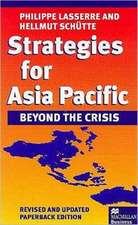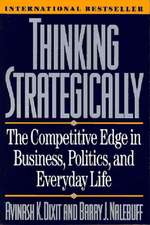Managing Business Portfolios Effectively: On the Explanatory Power of the Parenting Advantage Concept
Autor Matthias Krühleren Limba Engleză Paperback – 11 mai 2012
Preț: 382.95 lei
Nou
Puncte Express: 574
Preț estimativ în valută:
73.29€ • 76.23$ • 60.50£
73.29€ • 76.23$ • 60.50£
Carte tipărită la comandă
Livrare economică 14-28 aprilie
Preluare comenzi: 021 569.72.76
Specificații
ISBN-13: 9783834935007
ISBN-10: 383493500X
Pagini: 208
Ilustrații: XV, 224 p. 5 illus.
Dimensiuni: 210 x 148 x 15 mm
Greutate: 0.3 kg
Ediția:2012
Editura: Gabler Verlag
Colecția Gabler Verlag
Locul publicării:Wiesbaden, Germany
ISBN-10: 383493500X
Pagini: 208
Ilustrații: XV, 224 p. 5 illus.
Dimensiuni: 210 x 148 x 15 mm
Greutate: 0.3 kg
Ediția:2012
Editura: Gabler Verlag
Colecția Gabler Verlag
Locul publicării:Wiesbaden, Germany
Public țintă
ResearchCuprins
Exploring Parenting Advantage.- Analyzing Parenting Advantage.- Operationalizing Parenting Advantage.- Identifying and Evaluating Parenting Strategies.- Do Parenting Strategies Pay Off for Private Equity Firms?.
Notă biografică
Dr. Matthias Krühler completed his doctoral thesis under the supervision of Prof. Dr. Michael Nippa at the Chair of Management, Leadership and Human Resources, Technical University of Freiberg. He is a Project Leader and member of the Corporate Development practice area of a global management consulting company.
Textul de pe ultima copertă
The concept of parenting advantage offers a clear framework and guiding principle for corporate-level decision-making, including corporate portfolio management and corporate organization. Matthias Krühler fundamentally investigates the ability and explanatory power of the parenting advantage concept in order to effectively manage business portfolios. His theoretical, conceptual, and empirical research addresses identified shortages and expands the scientific application of the 1994 introduced concept. The author provides a number of valuable contributions for strategic management theory, reveals new avenues for future research on corporate strategy, and highlights normative implications for corporate management practice.












